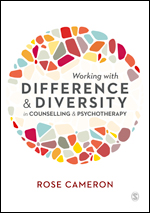Working with Difference and Diversity in Counselling and Psychotherapy
Rose Cameron - University of Edinburgh, UK
This book guides you through the complexities of working with difference and diversity in counselling and psychotherapy. It introduces you to contemporary thinking on the construction of difference, social identity and culture, and applies the theory to therapy practice. With reflective exercises and case examples, it will help you to work more confidently and sensitively with difference.
Rose Cameron is a practitioner and a trainer in counselling and psychotherapy. She is currently a Teaching Fellow at the University of Edinburgh.
Available formats
See what’s new to this edition by selecting the Features tab on this page. Should you need additional information or have questions regarding the HEOA information provided for this title, including what is new to this edition, please email sageheoa@sagepub.com. Please include your name, contact information, and the name of the title for which you would like more information. For information on the HEOA, please go to http://ed.gov/policy/highered/leg/hea08/index.html.
For assistance with your order: Please email us at textsales@sagepub.com or connect with your SAGE representative.
SAGE
2455 Teller Road
Thousand Oaks, CA 91320
www.sagepub.com
Need: a practical book on the core topic of working with difference and diversity
Feature: This book explores the key competencies needed to work ethically and in a culturally sensitive manner
Benefit: Students can feel confident and equipped to work with a range of clients and, crucially, with clients who have different identities or backgrounds from their own
N: Students need to identify and be aware of their own socio-cultural position and explore their own prejudices
F: The book is packed with experiential and reflective exercises to help readers reflect on their own 'blind spots, 'invisible norms' and 'unearned privilege'
B: Students develop reflexive awareness of their biases and assumptions and to help work with individuals from a range of backgrounds
N: There are a multitude of theoretically dense texts on this topic, and a confusing array of terms (anti-oppressive practice, cross-cultural counselling; multi-cultural counselling, etc.)
F: this book will unpick the key theories and terms through clear and accessible language
B: Students gain a strong foundation of knowledge, getting to grips with the key terms, concepts and theories
N: Many texts take an outmoded approach to the topic, listing areas of difference chapter-by-chapter (gender and sexuality, race and ethnicity, disability, class, age, religion) which doesn't recognise the reality of the clients' lives
F: This book takes an intersectional approach to difference
B: The book helps students understand that individuals can be disadvantaged on the basis of more than one area of difference

